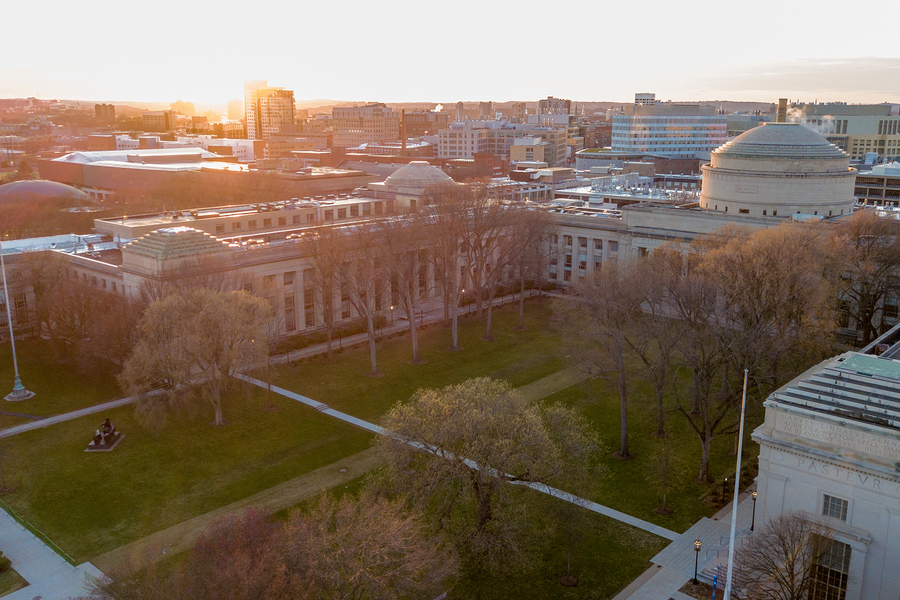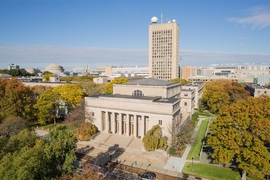Task Force 2021 and Beyond is entering the next major phase of its work to position MIT for the post-Covid world, co-chairs Rick Danheiser and Sanjay Sarma announced today in a letter to the MIT community.
In the first phase of the task force’s work, which ran from last June through December, nearly 200 MIT faculty, staff, and students served in working groups that generated more than 50 discrete ideas intended to help MIT emerge strong from the disruption of Covid-19.
“We have spent the past three months developing a plan and a structure to advance these ideas,” wrote Danheiser, chair of the faculty and Arthur C. Cope Professor of Chemistry, and Sarma, vice president for open learning and Fred Fort Flowers and Daniel Fort Flowers Professor of Mechanical Engineering. “Today we launch the second phase of Task Force 2021 and Beyond, focused on refining these ideas and planning for their implementation.”
In this next phase, different groups — known as Refinement and Implementation Committees (RICs) — will determine how best to make progress on 16 sets of ideas and proposals put forth during the previous phase.
“Some of these ideas emerged from Phase 1 in well-developed form, and in these cases only one or two meetings of the relevant RIC may be necessary,” Danheiser wrote in a recent Faculty Newsletter column. “Other RICs are expected to meet throughout the spring semester and in these cases meetings with students and colleagues via forums will likely be appropriate.”
Efforts to refine and implement ideas
The RICs are organized into five pillars, representing the broad themes that emerged from last year’s work. Those five pillars are:
1. Rethink how and where we work and revamp employee development and spaces, leveraging what we’ve learned about remote teaching, learning, and working during the pandemic.
Specific RICs under this pillar seek to:
- Plan and pilot flexible work practices and policies, as well as platforms, data, and systems to support such practices. Consider short-, medium-, and long-term needs, carefully weighing flexibility, sustainability, and our community’s needs.
- Establish integrated opportunities for all employees to develop skills for mentorship, management of teams, and career advancement through tools, training, and support of career pathways and networks at MIT.
- Consider how changing technology and work practices affect our needs for space, including academic classrooms, community spaces, research spaces, outdoor spaces, work spaces, and flexible spaces. Consider also an expanded definition of campus, including locations outside of Cambridge.
2. Review our classroom education in light of evolving curricula, the increasing necessity for lifelong learning, and possibilities created by leveraging technology.
Specific RICs under this pillar seek to:
- Review how best to leverage digital technologies in pedagogy and how best to use class time for that which can best be done in person.
- Consider opportunities for incorporating education experiences involving social responsibility, public service, sustainability, and appreciation of structural, systemic, and institutional hierarchies.
- Articulate a future view for community and outdoor spaces, classrooms, and other academic spaces.
3. Increase the scope and intensity of our holistic learning and training, developing each member of the MIT community to foster the ability and passion to work wisely, creatively, and effectively for the betterment of humankind.
Specific RICs under this pillar seek to:
- Review and recommend ways to enhance undergraduate advising, mentoring, and development.
- Consider models for holistic graduate education and recommend professional development opportunities.
- Review and recommend ways to enhance the scope and effectiveness of graduate advising and mentorship.
- Review and provide concrete recommendations for career paths and support for postdocs, research scientists, and instructional staff.
4. Articulate our public responsibilities and imbue these ideals in our community and culture, infusing them more deeply in our student education and human resources.
Specific RICs under this pillar seek to:
- Define our public responsibilities globally and locally, and integrate these responsibilities into our student education and organizational structure.
- Enact a plan that attracts, acculturates, develops, rewards, and retains exceptional individuals and reflects our aspirations for diversity, equity, and inclusion.
- Provide recommendations to support research collaborations, including multidisciplinary collaborations to solve large, pressing problems; share research data, equipment, and other resources; and foster industry and international collaborations.
5. Modernize our data, systems, processes, and financial models to serve future economic realities and our evolving needs.
Specific RICs under this pillar seek to:
- Address concerns related to under-recovery funding levels and processes.
- Provide more financial support to residential students with greater needs.
- Develop a new financial model for the Institute, reflecting more diverse and multifaceted sources of funding.
- Support transformational internal projects with a new cross-functional team and digitized data-sharing practices across departments, labs, and centers.
- Develop a plan to address the high costs of graduate students at MIT.
Some of the RICs have already held initial meetings, and the rest will convene soon. Each includes relevant task force members who were involved in generating the initial ideas, as well as others who will be involved in implementing those ideas. Most of the RICs will develop goals and metrics for tracking progress over the next few years.
The MIT community is encouraged to provide input to each of the RICs via the Task Force 2021 and Beyond website.











